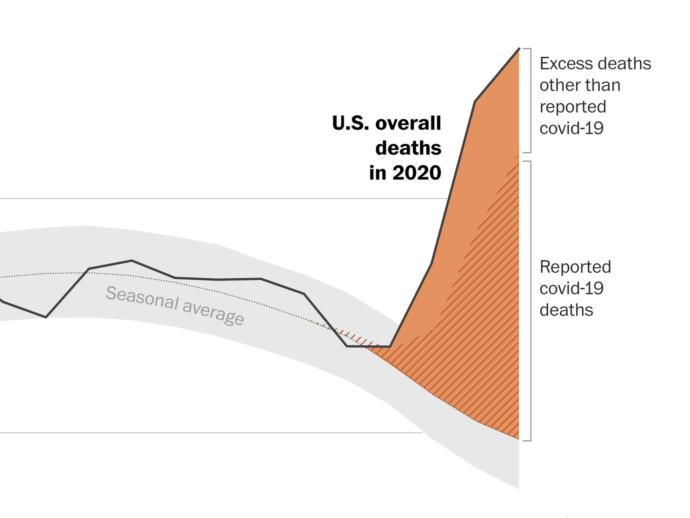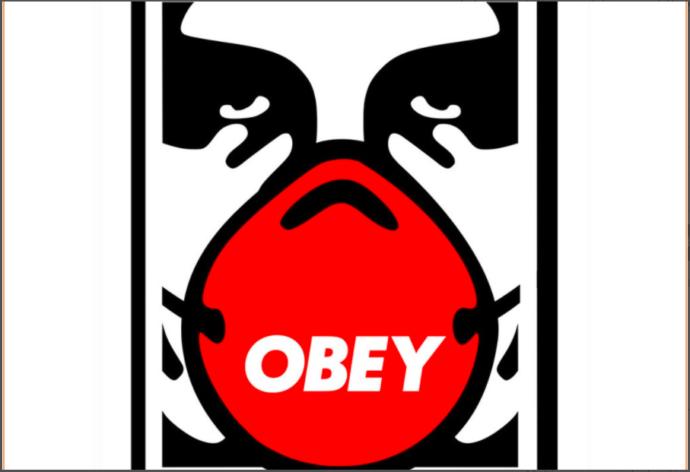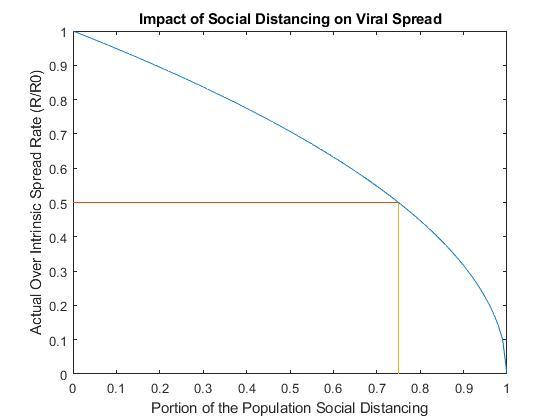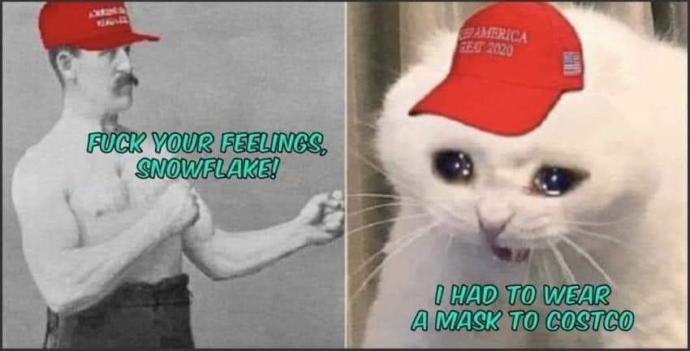
Hello everyone, as you all know we are in the midst of a 100 year pandemic with the current COVID-19 crisis. But many people have spread misinformation to try to downplay the severity of the crisis so here I'd thought I'd refute some of the main talking points.
Inflated Mortality Rate
When the virus first broke out in Wuhan, the estimated mortality rate was 3.4%. Since then there have been many reported that give mortality rates closer to that of the common flu. However, most of these estimates came from total infection rates based on antibody tests at a time when the tests gave estimates between the actual infected rate being 6 to 100+ times greater than what was recorded. Yeah, that's not a huge margin of error. Another argument is that many people already have acquired immunity via exposure to other coronaviruses. However, if you look at research on the topic, exposure to other coronaviruses doesn't make you "immune", it makes you less likely (by an undetermined margin) of contracting and dying from the disease.
As of 9/26/2020, the total worldwide deaths from coronavirus was at 990,000 and the total recovered was at 22,500,000 which gives an observed mortality rate of 4.21%. In the US, we've had a total of 3.82 million recoveries and 207 deaths so that gives an observed mortality rate of 5.1%. So while it is likely that there have been many unrecorded cases of coronavirus, for it to have a mortality rate comparable to the flu (.1%), the total number of people infected would have to be greater than the entire US population (the total cases in the US stand at 7.12 million). Over the summer, data has come in that indicated that the mortality rate was closer to 1%. While highly dubious (and as discussed later doesn't necessarily contradict the initial estimates), if 70% of the population of the US gets infected and 1% of the infected die that's still 2.345 M deaths.
Faked Death & Co-Morbidities
An argument that many denialists will use is that the death-toll has been over inflated by incorrectly labelling people who died of other causes as being victims of coronavirus. Well, first of all our healthcare system is far from perfect and there will always be some incorrectly classifying the cause of death. Denialists will often claim that hospitals get extra funding if they have more cases so are deliberately mis-attributing deaths to coronavirus. However, at this point, the claim is pure conjecture based only on circumstantial evidence. But we have to remember that this is a double edged sword and just as deaths from other causes can be falsely attributed to coronavirus, deaths due to coronavirus can be falsely attributed to other causes. If you think there's money in faking deaths due to extra funding, there's far more (in the short term) in covering the death count so businesses can stay open.
Others have pushed a watered down version of the misattributed death narrative where people who died of coronavirus also had pre-existing conditions or were killed by something relating to the broader effects of coronavirus versus the direct impacts of the virus itself. This has led many to think that deaths (roughly 94% were associated with co-morbidities) due to coronavirus have been vastly overstated. Here's the problem: the CDC holds coronavirus to the same standard that it does any other infectious disease and most people who die of influenza aren't exactly in peak condition when they contract it and there are usually secondary effects like bacterial infections in the lung that ultimately do them in (although the Spanish Flu pandemic was different in that it targeted the healthy for reasons that are debated to this day). But the point is that even if someone wasn't in good shape upon contracting the flu or coronavirus or if they specifically died due to a secondary infection, in all probability they would have survived had they not contracted coronavirus. But of the population infected, odds are that at least some of the people who contracted coronavirus would have died anyway. So how can we tell how many people died specifically to coronavirus? Well, we can compare how many people died in 2020 to the average number of deaths in previous years. And when we do that we find that the number of excess deaths is actually greater than the reported COVID-19 deaths (i.e the death-toll is under-reported). So the claim that the total deaths have been inflated by counting co-morbidities is complete BS.

Ruining the Economy
In order to slow down the spread of the pandemic and flatten the curve, many countries have been forced to lock down their economy and only keep essential businesses open. As you can imagine, this caused the economy to take a substantial hit with many businesses having to close permanently. This has also caused a lot of the stress in the overall population, leading to a spike in alcohol and drug use. This has led some to claim that the cure is worse than the illness when we've seen *ahem comparatively few deaths. Denialists claim that we were supposed to see millions of deaths when we're "only" at 200 K now. Well this is a version of the anti vaxer paradox; anti vaxers claim we don't need vaccines because so few people get measles when the reason so few people get measles is because we vaccinate the population. Similarly, coronavirus down-players say we don't need a lockdown because so few people have died when the reason so few people have died due to the pandemic is because of the lock-down.
A more common belief is that while we've sacrificed economic growth to save lives but this claim is untrue as well (but not for the reason down players would claim). It gets into what I call the "cancer treatment false dichotomy". Here's what I mean by that: a common misconception is that if people are diagnosed with cancer they have two options. The first is endure the pain of chemo and radiation in the hopes of surviving and the second is to enjoy the rest of your life and die peacefully in a bed somewhere. However, this view is untrue because as brutal as the side effects of chemo and radiation are, in the process of taking your life the cancer will cause you all of the agony the treatments do and more so if you'll suffer either way, the best option is to take the course of action that will give you the best chances of survival. How does this relate to coronavirus and the economy? Well argue that the death toll is over-inflated all you like but what's not up for debate is that coronavirus makes you very sick for a long period of time (when experts talk about 'mild cases' it usually means you didn't have to got to the hospital). In fact when this take was written on 10/1/20, a total of 7.26 M had been infected with coronavirus while 4.767 M had either recovered or died so even this late in, 34.34% of the people infected with coronavirus are still sick with it. Sufficive to say that if we let the economy rip, ~1/2 of the population would be too sick to work for weeks and ~1/4 for months on end. If you think the lockdown was bad for the economy, imagine what that would do. furthermore, unlike the the lockdown, the virus won't discriminate between essential and non-essential workers (food production, power generation, water sanitation, etc...) all that good shit. Yeah, that wouldn't cause a shit ton of "co morbidities" from cascading effects. So any policy implemented to mitigate a disaster will have a cost but that doesn't mean the effect of just letting the disaster happen wouldn't be way worse. The same applies to coronavirus at the social AND economic level.
Shifting Advice
One argument put fourth is that recommendations by health organizations are BS because they've been flip flopping with the advice given. But this ignores a huge elephant in the room: this is a NOVEL coronavirus. We could only make inferences about coronavirus going into this pandemic so that's what our initial lockdown measures are going to be based off of. As new data comes in, we adjust our strategy accordingly. For example, in previous coronavirus outbreaks and more broad scale pandemics, there was very little evidence of pre-symptomatic transmission and surface contact played a major role but as we got data from this pandemic, we realized that both of these assumptions were false and over-stated in the present situation. The main reason that pre-symptomatic transmission is such an issue with this pandemic (and hence why wearing a mask can limit the spread of the pandemic) is because there is such a long incubation period for coronavirus. This is also what claims of as many as "40% of the people being infected show no symptoms" come from; it's not that they won't become symptomatic, they just haven't become symptomatic yet because the virus is still in the incubation period. Many have tried to turn this argument on its' head and say that we acted prematurely based on "preliminary data" and that such a response wasn't justified given what little information we had at the time. But what's the alternative? Wait until it runs through the population and exacts its' death toll so we can have accurate information? Kinda too late by then. With any estimates, you have a margin of error and in accordance with the central limit theorem, the larger the sample size, the smaller the margin of error as the measured mean approaches the actual mean. While there was still a wide margin of error for the contagiousness and mortality rate for COVID-19 when the lockdown was enacted, the mortality and transmission rate for the seasonal flue were far below the margin of error for coronavirus while those values for other pandemic diseases such as the Spanish Flu were well within said margin of error so we did have enough information to justify the response undertaken.
The main reason coronavirus was so deadly in NYC despite the strict lockdown is because it was hit early before we knew how to more effectively treat and contain it. It is true that it was hit a little bit later than the west coast but there is good evidence to suggest that the viral strain that hit NYC was the more virulent European variety. And you know how early estimates of the mortality rate were put a 3.4% while current estimates are around 1%, well the most likely reason for the change in mortality rate isn't that the original estimates were wrong but that we lowered the mortality rate by learning from experience how to more effectively treat coronavirus. A key thing we have to remember through this crisis is that knowledge is power and while it may be discouraging to hear about how we'll need more lockdowns in the future, as we learn what works and what doesn't in terms of containing the virus, we can have more effective and less restrictive lockdowns. Remember, we're all in this together.
The rise of State Tyranny

Many people have claimed that the coronavirus pandemic is a "casedemic" or a mechanism by which state tyranny is trying to be imposed. Some go even as far to claim that the lockdown measures are unprecedented and compare the lockdown to the abolition of civil rights in the aftermath of the Reichstag fire in 1933. However, the first claim is blatantly false because similar measures were imposed during the Spanish Flu pandemic. Now you can draw parallels between any historic events if you dig deep enough but stop and think is the US response to a pandemic more comparable to the response to a fire in Nazi Germany or to the US response to a pandemic. Some might call this an "appeal to history fallacy", claiming that we also incarcerated the Japanese Americans in WWII because of a perceived threat but that obviously wasn't right. However, that ignores one major question: did the policy succeed in what it set out to accomplish without causing more harm than good? For interment the answer is no and for the lockdown, the answer is yes. People opposed to the lockdown measures and mask mandates also insist that social distancing violates the freedom of association and the mask mandates is the government telling people what they have to wear. While the first amendment prohibits the government from barring people for gathering for the sake of gathering, it doesn't allow people to gather in a way that puts public safety in danger. The analogy of shouting fire in a crowded theatre is often used to illustrate how the freedom of speech doesn't apply to all situations. I've read conflicting claims on whether or not that's illegal but what's more relevant to this pandemic is that fire codes do limit how many people can gather in theater because of the public safety risk. As for the government telling people what they have to wear being a first step toward state tyranny well than what are indecent exposure laws (and unlike the mask mandates those aren't slowing the spread of a pandemic). The only instance of a politician using the virus as lever for their political aims is Trump enacting an immigration ban that prohibited the issuing of green cards versus just putting admittance to the US on hold (which is what it would do if it was aimed solely at stopping the spread of the virus versus pushing an anti-immigrant agenda).
But there is one apparent inconsistency in the way that the left responded to mass gatherings. It has been pointed out that there was a huge outcry among the left about the anti-lockdown protests but no such condemnation of the BLM protests. This has lead many to claim that the virus has become politicized and the left is only OK with mass gatherings if they support their political agenda. However, in the real world, there are always a multitude of explanations for an apparent inconsistency and if we look at the data, what's apparent is that the BLM protests didn't cause a surge in coronavirus cases while events like the Sturgis Rally did. So which is more likely; that people are more outraged about right wing gatherings because they disagree with them or because they are more likely to spread coronavirus? Ockham's' Razor would suggest the latter. Now you might ask does this make any sense? Since when does a virus care about people's political views? Well it doesn't but people with certain political views are more inclined to take the virus more seriously at a personal as well as societal level and as a result, are will take more protective measures to limit the spread of the virus when gathering en masse. So no, you don't need to jump into any conspiracy theories to understand the discrepancy. There's only one instance where it appears data was being manipulated for a political end which is the red versus blue state case growth after hospital data went from the CDC to the HHS:

A third issue relating to the politicization of the virus is its' country of origin: China. This fact has resulted in racially motivated attacks against Chinese Americans which rings echoes from the past. Many on the American right have also slammed China for covering up the coronavirus death count early on but conspicuously absent are criticisms of the policy that actually allowed the virus to arise in the first place.
Of course, I'm sure that has nothing to do with the fact that repealing of environmental regulations (including the ones that prevent the genesis of zoonotic diseases) is an overwhelmingly right wing position. On top of that, wet markets aren't the only places with livestock keeping practices that are conducive to the emergence of new infectious diseases.
There have also been conspiracy theories that the virus had been genetically engineered as a bioweapon in a Wuhan lab. These claims are based on the fact that the host bat (Rhinolophus pusillus) for the immediate predecessor of the coronavirus was supposedly not present in the wet market the virus reportedly came from. But if you look at the paper that determined the virus was a recombinant, it states that the exact ancestral strain is unknown; the coronavirus that infects the host bat species that "wasn't present at the Wuhan market" was just the strain that the modern coronavirus had the closest genetic alignment with. So what likely happened was that the virus jumped from R. pusillus to another bat species that was then taken to the wet market where the bat virus then hybridized with a pangolin coronavirus.
So What's All the Fuss About?
I think Sam Seder summarized why so many people in the US hate the lockdown measures: it's because any response to a pandemic has to be first and foremost a communitarian response and so many anti-lockdown advocates have this perception that everything they have is due to their own merits and owe nothing to the society in which they live (individualistic snow-flakery). Some have made excuses like "if the government issues social distancing and mask recommendations, most people will follow it anyway so the mandates are pointless". While that may be true, the problem is that while there is an inverse relation between the percentage of the population social distancing and the viral spread rate, the relationship isn't linear but follows an upturned arc.

So it only takes a small portion of the population to not engage in social distancing for the virus to have half the spread rate that it would have if no one was social distancing (in other words, the rest of us have to pay for the fuck ups of the few; such is the nature of pandemics). Other anti lockdown advocates have invoked the tu quo que fallacy making claims like "lockdown advocates are OK with people driving even though we know people die in car accidents so what's the point of social distancing to 'save lives'". Well the problem is that social distancing doesn't prohibit any kind of interactions, it puts restrictions on them to limit the harm the virus causes to the overall population just like we have all kinds of traffic regulations (such as speed limits) to limit how many people die in car accidents. So this argument falls apart very quickly and the claim that "if people are so afraid of the virus, they should just stay home" is about as asinine as saying that "the government shouldn't tell us how fast we can drive on the highways and if people are afraid of getting in a car accident, they just shouldn't use them". This brings me to how self centered and myopic people who oppose laws that restrict the spread of the virus truly are.
People talk about their right not to have to government tell them they have to wear a mask or social distance but blatantly ignore the rights of others to carry out ESSENTIAL tasks (i.e. they can't just stay home if they're afraid of contracting the virus) without the fear of contracting a deadly disease and dying from it. While it's always a good idea to keep government power in check, here in the US, for years we've let the fear of government power (the one institution who's purpose it is to serve the public well being) blind us to the reality of the consolidation of private power, allowing corporate interests (to whom the public well being is just an externality). And we can see this blindness manifest itself in the pandemic in that so many people who can't fathom anything but the government or "nanny stare" taking away their freedoms that they would rather live (and die) at the mercy of a force of nature. The US response to the current pandemic is a perfect example of what happens when a third world problem collides with first world entitlement. People called the SJWs "entitled" but at least their sense of entitlement didn't put the rest of the country in danger. We are all in this together the pandemic response legislation is not submitting our freedom to "big brother" or the "nanny state", it's the people coming together as "big us" to present a united front against the current crisis.

Most Helpful Opinions